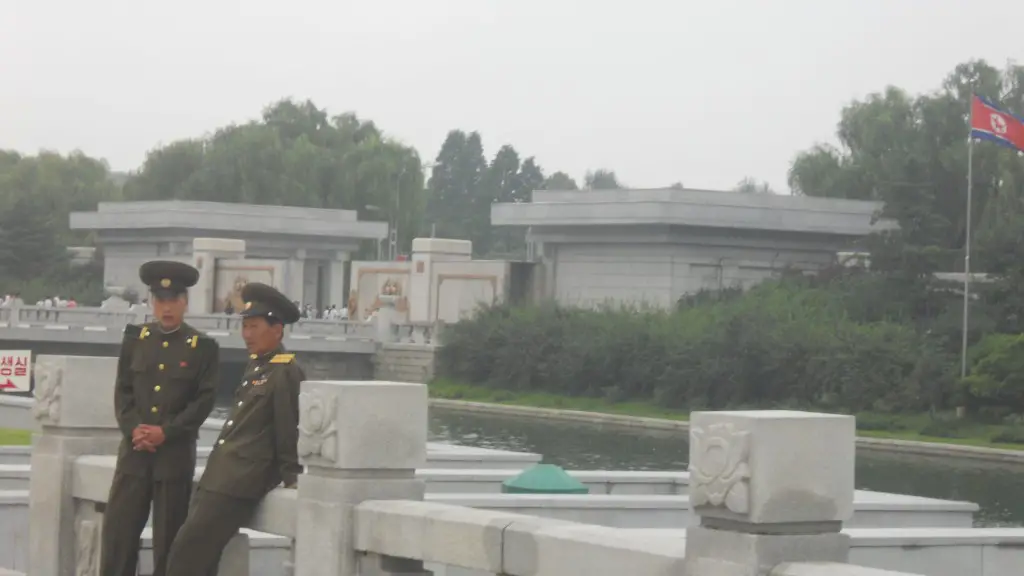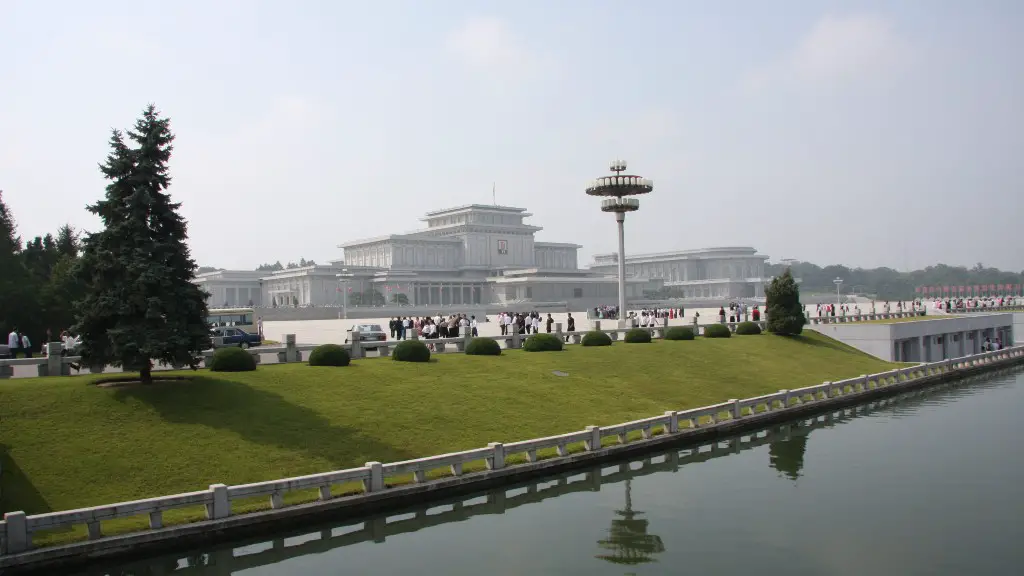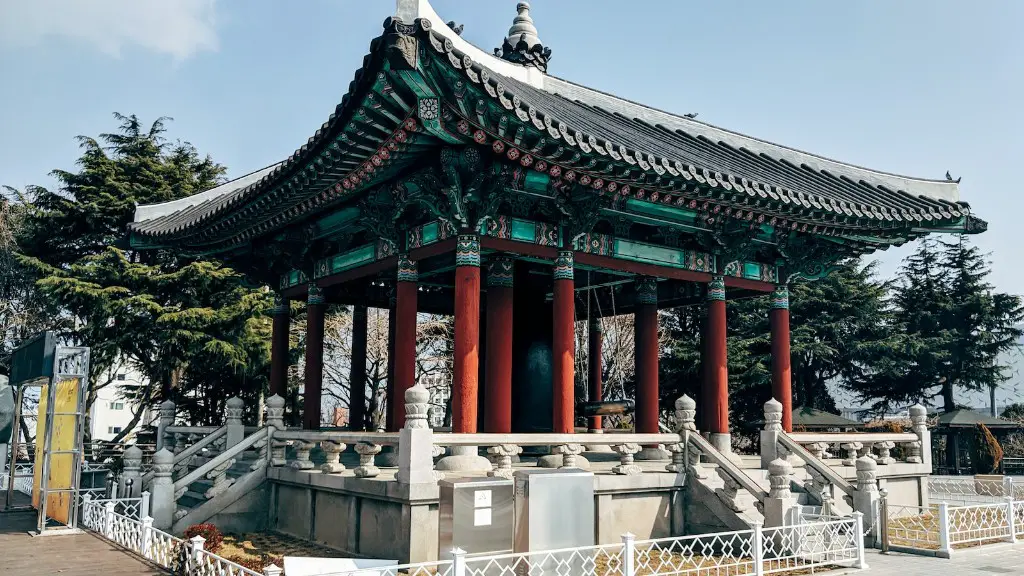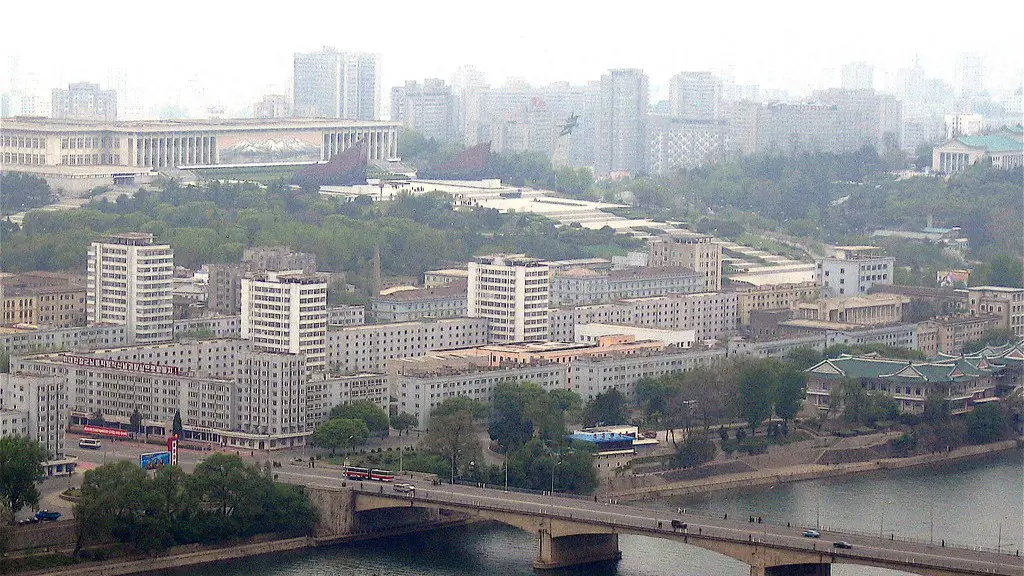In North Korea, Kim Jong un is an idolized figure and his father, Kim Jong il, is honored as a sacred leader. According to North Koreans, both leaders have led the country to become a powerful nuclear state. But what exactly do North Koreans believe about Kim Jong un?
One of the main beliefs of North Koreans is that Kim Jong un is following in the footsteps of his grandfather, Kim Il Sung. The North Korean state media describe him as the “peerless leader”, who will bring the country’s prosperity and strength as a nuclear power. This is often echoed by nationalistic citizens of the country, who regard him as a saviour and an irreplaceable asset for a new era of North Korean governance.
A further belief of North Koreans is that Kim Jong un has complete control over the military and the country. He is seen as a leader who will bring unity and stability to the nation, and maintain their nuclear power. North Korea’s military heavily venerates Kim Jong un and celebrates his birthday, known as the Day of the Sun, as a national holiday.
In addition, North Koreans believe that Kim Jong un is a benevolent leader and father figure that cares deeply for his people. Several propaganda campaigns have been launched which portray the leader as a caring and nurturing leader. One such campaign was the establishment of orphanages under the leadership of Kim Jong un, which overlook the welfare of children in the country.
Experts say that North Koreans truly believe in Kim Jong un and his leadership. He is viewed as a legitimate source of power and is seen as the key leader of their society who will bring unity and stability. The belief in Kim Jong un is so deeply rooted that if he were to leave power, it could potentially cause destabilization and a collapse of the state.
North Korea’s Control Of Information
North Koreans have very limited access to external sources of information, as the country is subject to extremely tight controls over the media. The media is heavily censored and monitored, with punishment for violators of the media regulations. This means that North Koreans are largely insulated from the information available abroad, which further reinforces the idea that Kim Jong un is the infallible leader.
Strict censorship and control of media is further compounded by the North Korean government’s use of propaganda to promote Kim Jong un as the only legitimate source of power. Propaganda posters, films, and other forms of media are used to create an image of Kim Jong un as an irreplaceable leader, which is accepted by the general citizens of North Korea.
The combination of information control and sophisticated propaganda campaigns has created a climate of fear and reverence for the leaders of the country. North Koreans are thus encouraged to accept the status quo and regard Kim Jong un as the infallible leader and protector of the nation.
Reasons For Kim Jong Un’s Authority
The personality cult surrounding Kim Jong un is perpetuated and driven by the people of North Korea, who are indoctrinated by the state’s propaganda. This combination of control and indoctrination is what keeps North Koreans loyal to the leadership of Kim Jong un.
The state-run Workers’ Party of Korea (WPK) has long seen Kim Jong un as the ultimate leader of the party and the country. Kim Jong un’s image is associated with national pride, security, and progressive thinking that is modernizing the country. He is seen as a powerful and iconic leader who is capable of inspiring North Koreans to strive for success.
The state media also plays a key role in boosting the legitimacy of Kim Jong un’s rule. The media portrays the leader in a positive light and seeks to legitimize his position as leader of the country. It celebrates Kim Jong un’s successes, downplays any failures, and portrays him as an infallible leader.
The reputation of Kim Jong un has been further strengthened by his direct control of the military. He is seen as the ultimate protector of the nation, and North Koreans are encouraged to demonstrate their loyalty to the leader and their country through loyalty to the military. Kim Jong un’s reputation is thus bolstered by a prosperous military.
International Pressure On Kim Jong Un
Despite the loyalty of North Koreans to their leader, the international community has increased pressure on Kim Jong un and his government in recent years, over their human rights abuses and nuclear weapons program. This has led to the introduction of economic sanctions, which have had a heavy impact on the country.
However, the North Korean government has remained largely defiant in the face of this pressure, often blaming the US and other external forces for their difficult economic situation. This has created an atmosphere of defiance and pride among North Koreans, and has strengthened the belief that Kim Jong un can overcome any foreign opposition and lead the nation to success.
The international community has also sought to engage with North Korea in recent years, in the hope of promoting peace and stability on the Korean peninsula. This has included direct talks with the North Korean leadership, and diplomatic engagement between the US and other countries.
It is clear that the international community is trying to cultivate an environment in which North Korea can be more open to the outside world. However, the government continues to propagate the belief that Kim Jong un is the only leader capable of leading the country, which further reinforces the idea of a unified North Korea led by a powerful leader.
The Fading Of Kim Jong Un’s Influence
Although North Koreans remain largely loyal to Kim Jong un, there are signs that his influence may be waning. Many of the country’s citizens are becoming disillusioned with the hardship caused by economic sanctions and the lack of economic opportunities. This has led to a gradual erosion of the unquestioning loyalty which was once held by the citizens of North Korea.
North Koreans are increasingly seeking alternative sources of information abroad and are becoming more critical of the government’s policies. As North Koreans begin to challenge the legitimacy of Kim Jong un’s rule, his ability to maintain his position as leader of North Korea is becoming increasingly tenuous.
There is also a growing divide between those in North Korea who still have faith in the government and the new generation of North Koreans who are more open to alternative ideas and views. This further highlights the changing dynamics in North Korea and the inevitable decline of Kim Jong un’s influence.
International Reactions To North Korea’s Beliefs
The international community has often been critical of North Korea and its belief in Kim Jong un. Critics have argued that the North Korean government is oppressive and does not allow freedom of thought or expression. They have also condemned the use of propaganda and the heavy censorship of the media.
Furthermore, there is a growing concern that North Korea’s belief in Kim Jong un is fostering an isolationist mentality that is damaging to the country’s development. This has caused some to call into question the effectiveness of diplomatic efforts to engage North Korea and promote peace on the Korean peninsula.
At the same time, however, there is an understanding that North Korea’s belief in Kim Jong un is deeply rooted and cannot be easily changed. It is therefore important to engage North Korea in a constructive manner and promote an understanding of the need for open dialogue and diplomacy in order to bring about positive change.
Restrictions Placed On North Korean Emigration
The loyalty of North Koreans to Kim Jong un has also had an impact on their ability to travel abroad. North Korean citizens are subject to strict travel restrictions and must obtain permission from the government in order to leave the country. This restriction is largely based on the fear that North Koreans will defect from the country and spread information about the regime.
The restrictions on travel have had a negative impact on the economic development of the country, as North Koreans are largely unable to take advantage of economic opportunities abroad. Furthermore, these restrictions have further limited North Koreans’ ability to access alternative sources of information, which reinforces their belief in Kim Jong un.
The restrictions on travel have been condemned by the international community as an infringement of basic human rights. Human rights activists have called on the North Korean government to loosen its restrictions on travel and to allow its citizens to travel more freely.
What The Future Holds For Kim Jong Un
It is unclear what the future holds for Kim Jong un and his rule in North Korea. In recent years, there have been signs that North Koreans are becoming increasingly disillusioned with the regime and the hardship caused by economic sanctions. This has led to a weakening of Kim Jong un’s grip on power, which could ultimately lead to his downfall.
At the same time, there is also a chance that North Koreans may rally around Kim Jong un in the face of external pressure, as they have done in the past. This could lead to a resurgence of loyalty and faith in Kim Jong un and his leadership.
Ultimately, the future of Kim Jong un and the North Korean regime will depend on the actions of the North Korean people, who will decide whether or not to continue to embrace their leader and the government. It remains to be seen how the future will unfold for the country and its leader.





